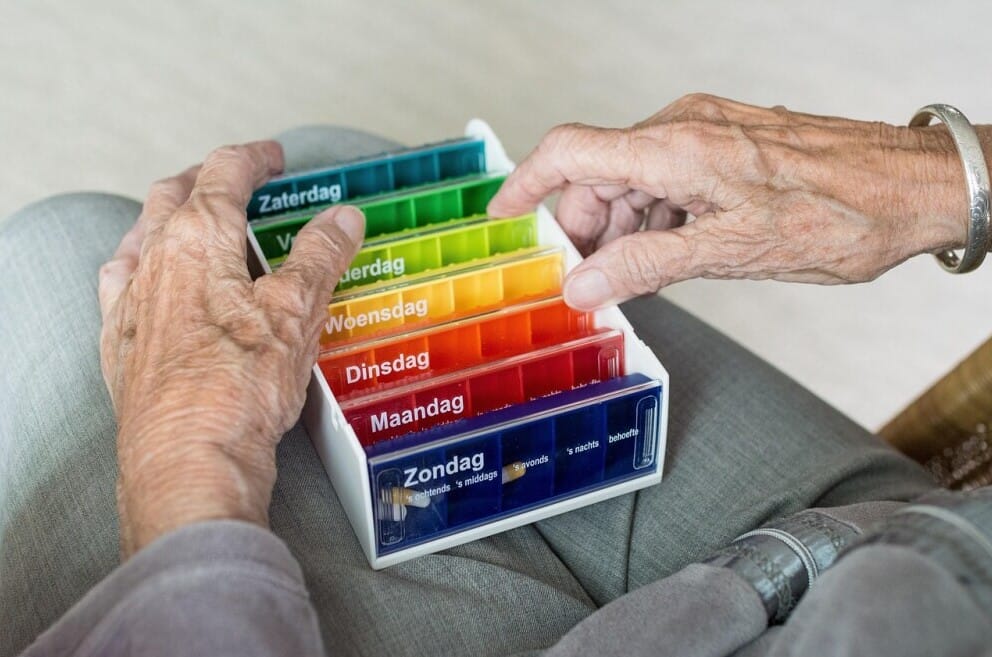Welcome to Our Guide on Medications in Fall Risk for Seniors!
Medications in Fall Risk for Seniors is a topic close to our hearts. We’ve seen firsthand how certain medications can affect balance and stability in our loved ones.
In this guide, we share insights on the powerful role that medications play in increasing fall risk for seniors.
Whether you’re a caregiver, a senior, or someone who cares about the well-being of a loved one, understanding how medications affect fall risk is key to living a safer life.
Understanding Medications in Fall Risk for Seniors
What Is Medication in Fall Risk for Seniors?
Medications help manage various health conditions, from high blood pressure to arthritis. Yet, some medications have side effects that influence balance, alertness, and muscle coordination.
This phenomenon shows that the benefits of a drug might sometimes come with unintended impacts on daily stability.
It is important to note that these effects vary from one individual to another, and careful review of one’s prescription can make a big difference.
Who Is Affected?
Seniors, especially those who take multiple medications, have an increased risk of falling. When several prescriptions interact, they can cause dizziness, impaired judgment, and decreased coordination.
Knowing this, seniors and their families often work closely with healthcare professionals to review medication regimens, ensuring that adjustments can be made when necessary.
Taking time to examine the various factors that contribute to side effects can also provide a clearer picture of the safest options available.
This topic is very important to address because understanding the specific interactions and potential risks helps in making informed decisions.
By discussing concerns with experts, patients can learn practical ways to reduce side effects, which in turn supports a more secure daily routine.
The Intricate Effects of Medication on Balance
How Medications Influence Balance and Alertness
Many medications are designed to work on specific body functions. However, some can also affect the senses that help us maintain balance.
For example, sedatives and certain pain medications might slow down reflexes. In the context of medication in fall risk for seniors, this can lead to a greater chance of falls, particularly in environments that require quick reactions.
It is important for those taking such medications to be aware of these side effects and adjust their activities accordingly.
Side Effects to Watch Out For
Dizziness, drowsiness, and blurred vision are common side effects. Recognizing these early signs can help seniors make important decisions such as using assistive devices or taking extra precautions in their home environment.
Discussing these effects with a pharmacist or doctor can provide clarity and may lead to alternative medication options that lessen the risk of falls. Being well-informed helps in managing both treatment and safety simultaneously.
Additional details on this subject can really give you a boost in understanding. It is beneficial to note that keeping track of when these side effects occur can help healthcare providers pinpoint the exact cause, ensuring that future prescriptions are safer and more targeted to your needs.
Medication Management and Safety Tips
How to Manage Your Medications Effectively
Managing medications properly is a practical step in reducing the risk associated with medication in fall risk for seniors.
Keeping an updated list of all medications, doses, and schedules is very helpful.
Using pill organizers or reminder apps can reduce the chance of missed or extra doses, which might otherwise lead to unwanted side effects.
Practical Tips for a Safer Home
Beyond managing medication, making some home adjustments can really help prevent falls.
For instance, ensuring clear walkways, using non-slip mats, and installing grab bars in the bathroom are steps that not only make daily life easier but also address some of the impacts of medication-related dizziness.
Building an all-in-one plan with your healthcare provider can be an excellent way to keep track of both your medication regimen and home safety measures.
It is also very important to consider improvements in daily organization. Small changes such as improved lighting and regularly checking the stability of furniture can add to the overall security of your home.
These careful adjustments make it easier to navigate through daily routines without unexpected hazards.
Impact on Daily Living and Fall Prevention Strategies
How Medication Influences Daily Routines
Daily routines can be altered by the side effects of medications. Simple activities such as moving from a chair to a standing position or navigating stairs might become challenging.
By understanding medication in fall risk for seniors, individuals can plan activities during times when side effects are minimal and use supportive devices when necessary. This proactive approach to daily life can help reduce incidents of falls.
Implementing Fall Prevention Strategies
Incorporating fall prevention methods is beneficial. Routine physical exercises, particularly those focused on balance and strength, can counteract some of the sedative effects that certain medications have.
It’s also useful to review your medications regularly with your doctor to ensure the benefits outweigh the risks. Being committed to both medication management and fall prevention promotes a well-balanced lifestyle for seniors.
Extra precautions such as scheduling exercise sessions and constantly monitoring your body’s responses during different times of the day can really give you a boost.
These additional measures not only help maintain balance but also foster greater independence and confidence in daily activities.
Communication with Healthcare Providers
The Role of Doctors and Pharmacists
Open communication with healthcare providers is a cornerstone of managing medication in fall risk for seniors.
Doctors can adjust dosages or suggest alternatives if the side effects prove too challenging, while pharmacists are valuable for answering questions regarding drug interactions.
When each member of your healthcare team shares your concerns, there’s a much better chance that your treatment plan will keep you safe while addressing your overall health needs.
Questions to Ask Your Healthcare Provider
Some great questions might include asking if a different medication is available, how long you should expect these side effects to last, or if your medication should be taken at a specific time of day to reduce fall risk.
These conversations can help tailor a plan that fits your needs and minimizes the risk of falling. Clear and open dialogue with your doctor and pharmacist creates a safety net for managing health more effectively.
It is also very important to check in regularly with your medical team. By doing so, you can catch potential issues early and make the most of their expert guidance.
Keeping a written record of your questions and concerns ahead of appointments ensures a productive conversation that addresses both immediate and long-term safety strategies.
Insurance, Costs, and Support for Medication Management
Managing Costs Related to Medication Reviews
Insurance and cost issues are often on the minds of seniors when it comes to managing medication in fall risk for seniors. Many insurance plans cover medication reviews and fall prevention consultations.
Researching available resources or seeking advice from a health insurance advisor can lead to programs that not only help with medication costs but also support home safety modifications.
Community and Support Resources
Various community resources can offer additional support. Local health departments and senior centers sometimes provide fall prevention workshops or support programs that focus on medication management.
Making the most of these resources when handling your medication routine can connect you with valuable social support networks that prioritize safety and overall well-being.
Exploring community programs and local services can also spark ideas to keep your living environment secure.
These additional support structures often offer hands-on demonstrations and advice that can be tailored to your specific lifestyle needs, ensuring that fall risk is consistently managed through multiple avenues of assistance.
Frequently Asked Questions on Medication and Fall Risk
Can changing a medication lower fall risk?
Yes. Sometimes, by changing the type or timing of a medication, healthcare providers can help reduce the risk of falling. It often requires careful monitoring and regular follow-up appointments to ensure that any adjustments made are both effective and safe.
What if I experience sudden dizziness?
If dizziness becomes sudden or severe, it’s important to contact your doctor immediately.
Early intervention can prevent falls and reduce the risk of injury. This is all part of understanding medication in fall risk for seniors and acting promptly to address any adverse effects.
Are there medications that are safer for seniors?
While no medication is entirely free of side effects, some options are considered safer because they have lower impacts on balance and coordination.
Your doctor is the best source to help determine which medication fits your specific health needs while minimizing fall risk.
Concluding Thoughts
If you loved these insights, don’t hesitate to share this guide with someone who might benefit from it. Stay proactive and informed by discussing medication side effects with your healthcare provider.
Managing medications in fall risk for seniors is an adventure, and every step you take adds up to a safer, more secure lifestyle.
We invite you to take a closer look at your current medications and your home environment. If you’re unsure, now is the time to get expert advice and make changes that could really give a boost to your quality of life.
Click on related resources, join discussions, and use expert tips to promote safer living every day.
For those seeking one more layer of assurance, consider reviewing this information periodically as your health needs change.
Keeping yourself updated on both medication effects and safety innovations can truly help in adapting your lifestyle.
Small consistent efforts may turn into major improvements and set a solid foundation for a secure future.
Thank you for reading.
If you have any other questions, please leave them below.
Have an awesome day.
Blessings always,
Maxine
Royal Palm Protection
Quote of the day:
“Be fearless, not fearful.” – Maxine Georges.
Shop Tips:
- Amazon eGift Card on Amazon
2. Books on Amazon
3. Set up bookshelf on Amazon
Have an awesome day!



